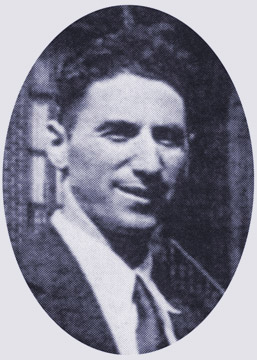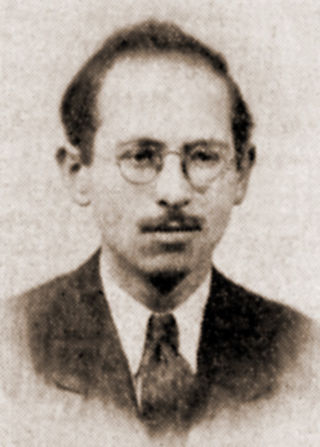Max Shachtman was an American Marxist theorist. He went from being an associate of Leon Trotsky to a social democrat and mentor of senior assistants to AFL–CIO President George Meany.

The Democratic Socialist Perspective (DSP) was an Australian socialist political group. It was founded in 1972 as the Socialist Workers League (SWL), changing its name to the Socialist Workers Party (SWP) a few years later. In the early 1990s it was once again renamed, as the Democratic Socialist Party, and in 2003 it became the Democratic Socialist Perspective.

Martin "Marty" Abern was a Marxist politician who was an important leader of the Communist youth movement of the 1920s as well as a founder of the American Trotskyist movement.
The League for Socialist Action (LSA) was the premier Trotskyist organization in Canada for much of the 20th Century. Throughout its history the LSA went through many different names and iterations. In chronological order it was known as: the International Left Opposition (Trotskyist) of Canada, the Workers Party of Canada, the Socialist Policy Group, the Socialist Workers League, the Revolutionary Workers Party, The Club, the Socialist Education League, and the League for Socialist Action.
Jack Barnes is an American communist and the National Secretary of the Socialist Workers Party. Barnes was elected the party's national secretary in 1972, replacing the retiring Farrell Dobbs. He joined the SWP in the early 1960s as a student at Carleton College in Minnesota and quickly became a leading member of the party's youth wing. From the 1990s to the present, Barnes has directed his party to support the governments of North Korea and Equatorial Guinea; has instructed the party to abstain from antiwar or anti-racist activism; and in January 2016 lent his support to the occupation of federal lands, in Oregon, by militia movement members. Barnes was a key advocate of the party's "turn to industry" in the 1970s, its exit from the Fourth International in the 1980s and its orientation towards the Cuban Communist Party in the 1990s.

George Breitman was an American communist political activist and newspaper editor. He is best remembered as a founding member of the Socialist Workers Party (SWP) and as a long-time editor of that organization's weekly paper, The Militant. Breitman also supervised and edited several important publishing projects as the head of the SWP's publishing house in the 1960s and 1970s.
Bert Cochran, born Alexander Goldfarb was an American Communist politician and writer. A Trotskyist, he was a member of the Socialist Workers Party from the 1930s to the 1950s.
The Socialist Union of America, also called American Socialist Union, Socialist Union or Cochranites were a Trotskyist group that split from the Socialist Workers Party in 1953 and disbanded in 1959. It included most of the SWPs trade union base, as well as others sympathetic to the "Pabloist" line of the International Secretariat of the Fourth International, though it was never recognized as a section of the ISFI.
The history of the Socialist Workers Party begins with the formation of the Socialist Review Group in 1950, followed by the creation of the International Socialists in 1962 and continues through to the present day with the formation of the Socialist Workers Party in 1977.

Albert Goldman (1897–1960) was a Belarusian-born American political and civil rights lawyer, closely associated with the American communist movement. Goldman broke with the mainline Communist Party, USA in 1933, joining the Trotskyist opposition, in which he would be a leading participant for the better part of the next two decades. Goldman is best remembered as a defendant and lead defense attorney in the 1941 Smith Act prosecution of the leadership of the Socialist Workers Party.
The Spartacist League is a Trotskyist political grouping which is the United States section of the International Communist League, formerly the International Spartacist Tendency. This Spartacist League named themselves after the original Spartacus League of Weimar Republic in Germany, but has no formal descent from it. The League self-identifies as a "revolutionary communist" organization.
The Revolutionary Tendency within the American Socialist Workers Party was an internal faction that disagreed with the direction the leadership was taking the party on several important issues. Many groups and movements would have their roots in the RT, both in the United States and internationally, including the Socialist Equality Party and the world Spartacist and LaRouche movements and their various splinters.
The International Committee of the Fourth International (ICFI) is the name of two Trotskyist internationals; one with sections named Socialist Equality Party which publishes the World Socialist Web Site, and another linked to the Workers Revolutionary Party in the UK.
The Workers Party (WP) was a Third Camp Trotskyist group in the United States. It was founded in April 1940 by members of the Socialist Workers Party who opposed the Soviet invasion of Finland and Leon Trotsky's belief that the USSR under Joseph Stalin was still innately proletarian, a "degenerated workers' state." They included Max Shachtman, who became the new group's leader, Hal Draper, C. L. R. James, Raya Dunayevskaya, Martin Abern, Joseph Carter, Julius Jacobson, Phyllis Jacobson, Albert Glotzer, Stan Weir, B. J. Widick, James Robertson, and Irving Howe. The party's politics are often referred to as "Shachtmanite."
The International Communist League (Fourth Internationalist), earlier known as the international Spartacist tendency (iSt) is a Trotskyist international. Its largest constituent party is the Spartacist League (US). There are smaller sections of the ICL (FI) in Mexico, Canada, France, Germany, Ireland, Italy, Japan, South Africa, Australia, Greece and the United Kingdom.

The International Socialist Organization (ISO) was a Trotskyist group active primarily on college campuses in the United States that was founded in 1976 and dissolved in 2019. The organization held Leninist positions on imperialism and the role of a vanguard party. However, it did not believe that necessary conditions for a revolutionary party in the United States were met; ISO believed that it was preparing the ground for such a party. The organization held a Trotskyist critique of nominally socialist states, which it considered class societies. In contrast, the organization advocated the tradition of "socialism from below." as articulated by Hal Draper. Initially founded as a section of the International Socialist Tendency (IST), it was strongly influenced by the perspectives of Draper and Tony Cliff of the British Socialist Workers Party. It broke from the IST in 2001, but continued to exist as an independent organization for the next eighteen years. The organization advocated independence from the U.S. two-party system and sometimes supported electoral strategies by outside parties, especially the Green Party of the United States.

The Socialist Workers Party (SWP) is a far-left political party in the United Kingdom. Founded as the Socialist Review Group by supporters of Tony Cliff in 1950, it became the International Socialists in 1962 and the SWP in 1977. The party considers itself to be Trotskyist. Cliff and his followers criticised the Soviet Union and its satellites, calling them state capitalist rather than socialist countries.

James Patrick Cannon was an American Trotskyist and a leader of the Socialist Workers Party.

The Socialist Workers Party (SWP) is a communist party in the United States. The SWP began as a group that was expelled from the Communist Party USA for supporting Leon Trotsky over Soviet leader Joseph Stalin. Since the 1930s, it has published The Militant as a weekly newspaper. It also maintains Pathfinder Press.

The International Socialist Tendency (IST) is an international grouping of unorthodox Trotskyist organisations espousing the ideas of Tony Cliff (1917–2000), founder of the Socialist Workers Party (SWP) in Britain. IST supporters are sometimes called "Cliffites". It has sections across 27 countries; however, its strongest presence is in Europe, especially in Britain.








